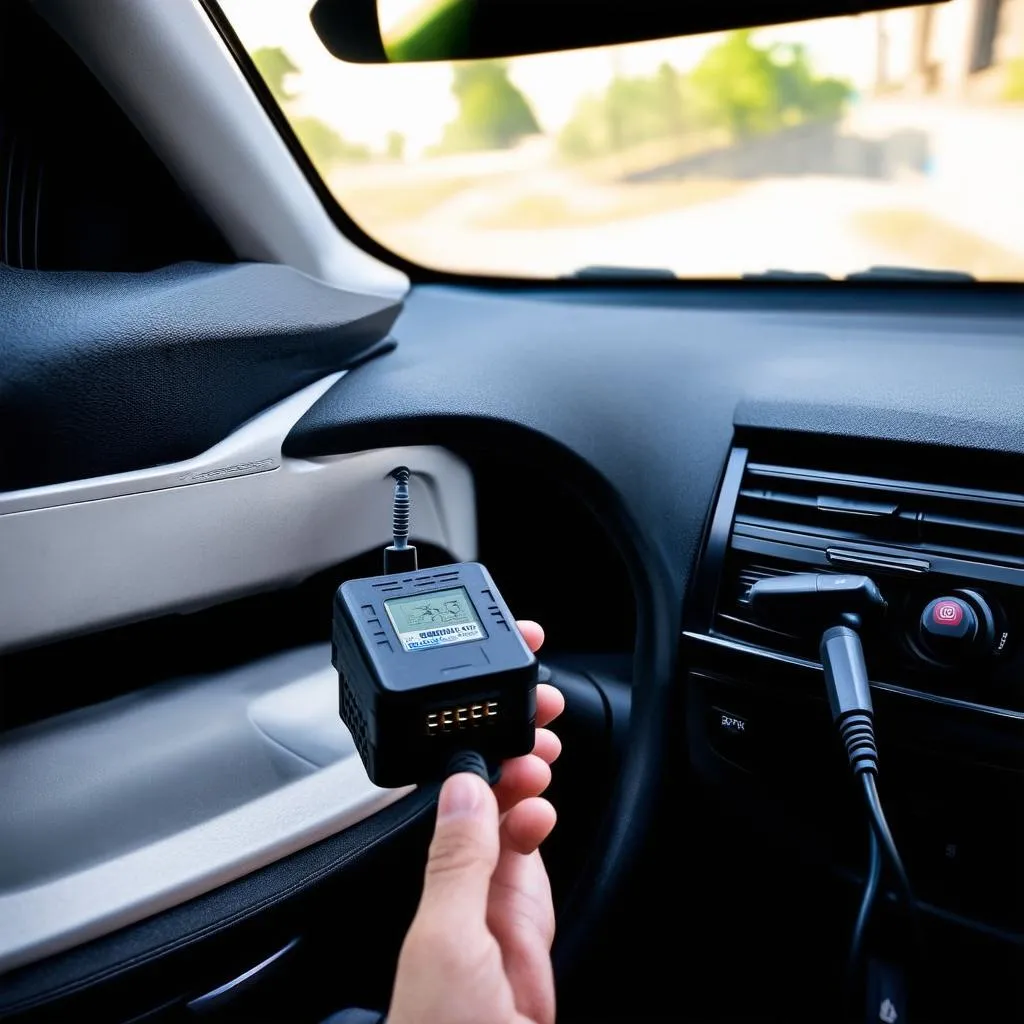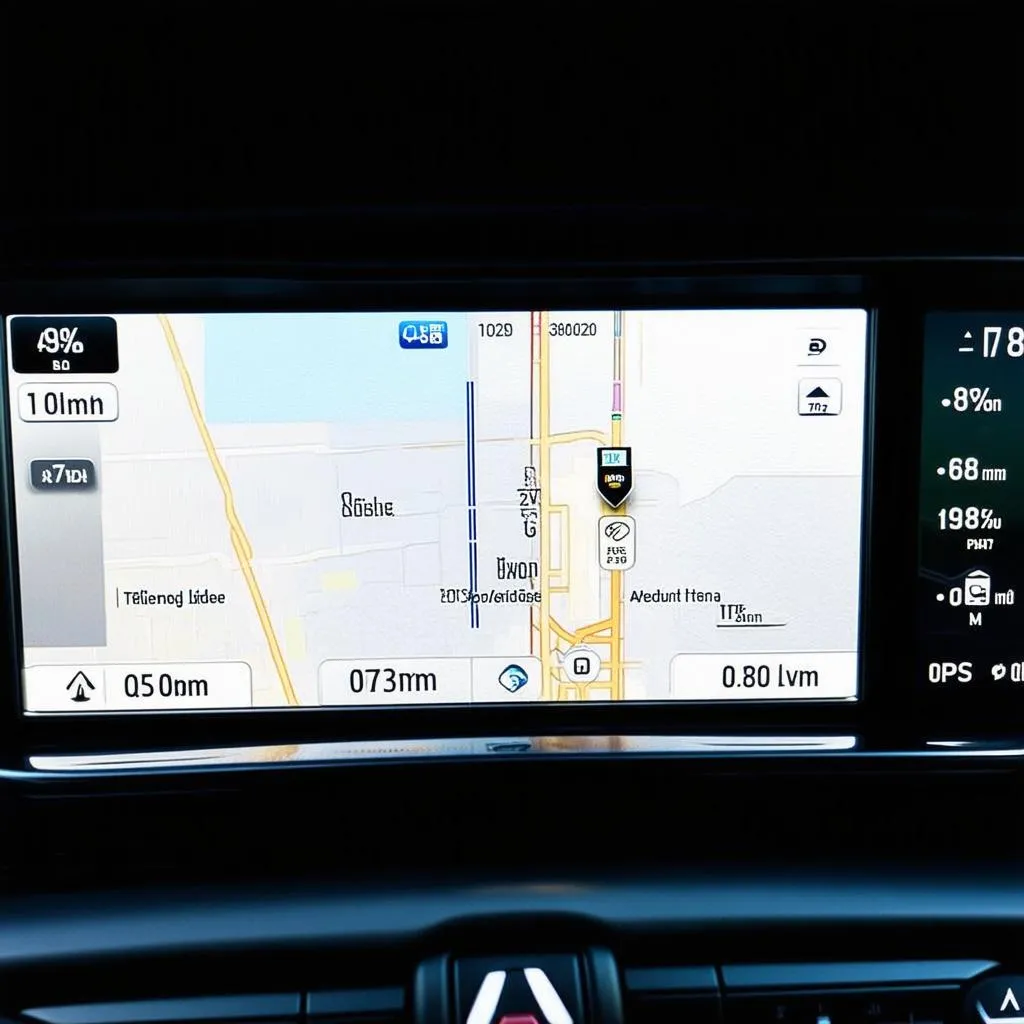Have you ever wondered how your car’s navigation system works? Or maybe you’ve been curious about the mysterious “OBD” port tucked away under your dashboard? Today, we’re diving deep into the world of Gps Obd technology, uncovering its secrets and revealing its potential for enhancing your driving experience.
What is GPS OBD?
GPS OBD combines two key technologies: Global Positioning System (GPS) and On-Board Diagnostics (OBD). Let’s break down each component:
- GPS: Imagine a network of satellites orbiting Earth, constantly beaming signals to receivers on the ground. These signals pinpoint your exact location, allowing your car’s navigation system to guide you to your destination.
- OBD: This is a diagnostic system built into your car, essentially a “black box” that monitors various aspects of your vehicle’s performance. The OBD port allows mechanics to access this data, diagnose problems, and repair your car efficiently.
Think of GPS OBD as a bridge between these two technologies. It leverages the power of GPS for tracking location and uses the OBD port to access valuable information about your car’s health.
The Benefits of GPS OBD
GPS OBD has revolutionized the automotive world, offering a range of benefits for both drivers and technicians:
- Real-time vehicle tracking: Ever worried about your car’s whereabouts? GPS OBD provides precise location updates, offering peace of mind and helping you keep tabs on your vehicle.
- Enhanced diagnostics: By tapping into the OBD data stream, you can gain insights into your car’s performance, identifying potential issues before they escalate.
- Driving behavior analysis: GPS OBD devices can track your speed, acceleration, braking, and fuel consumption, providing valuable feedback to improve your driving habits and optimize fuel efficiency.
- Theft recovery: In case of theft, GPS OBD devices can help track your vehicle’s location, increasing the chances of recovery.
Common GPS OBD Applications
Now that you understand the basics, let’s explore how GPS OBD is used in practical scenarios:
- Fleet management: Businesses with large fleets can utilize GPS OBD devices to monitor vehicle location, optimize routes, and track fuel consumption, leading to cost savings and improved efficiency.
- Insurance telematics: Some insurance companies offer discounts for drivers who install GPS OBD devices, allowing them to monitor driving habits and reward safe driving practices.
- Personal safety: By sharing your location with loved ones, GPS OBD can provide peace of mind and enable them to track your journey in case of emergencies.
- Automotive aftermarket: Numerous aftermarket accessories leverage GPS OBD technology, from dash cameras and speed limiters to fuel-saving devices and remote start systems.
Frequently Asked Questions
Can I use a GPS OBD device on any car?
Yes, but with some caveats:
- Most modern vehicles (from around 1996 onwards) are equipped with an OBD-II port, which is compatible with GPS OBD devices.
- Older vehicles may require a specialized adapter.
How accurate is GPS OBD?
The accuracy of GPS OBD depends on factors like satellite signal strength, weather conditions, and the quality of the device. However, modern GPS OBD devices offer highly accurate location tracking, typically within a few meters.
Is GPS OBD legal?
Generally, GPS OBD devices are legal, but it’s always wise to check local regulations and privacy laws, especially if you’re using the device to track other individuals.
What are some popular brands of GPS OBD devices?
The market offers a wide range of GPS OBD devices from reputable brands like Trackimo, Vyncs, Carista, and OBDLink.
Where can I buy a GPS OBD device?
You can find GPS OBD devices online on platforms like Amazon, eBay, and Aliexpress, or at local automotive stores.
How do I install a GPS OBD device?
Installation is typically straightforward:
- Locate the OBD-II port (usually under the dashboard).
- Plug the GPS OBD device into the port.
- Configure the device using the accompanying app.
How much does a GPS OBD device cost?
Prices vary depending on the features and brand, but you can generally find a good GPS OBD device for $30 to $100.
The Future of GPS OBD
As technology advances, we can expect even more innovative applications of GPS OBD technology:
- Predictive maintenance: GPS OBD devices can collect data to anticipate potential car problems, allowing for preventative maintenance and reducing unexpected breakdowns.
- Autonomous driving: GPS OBD plays a crucial role in gathering location and vehicle data for self-driving cars, contributing to their safe and efficient operation.
- Connected car services: GPS OBD technology connects your car to the internet, enabling features like remote diagnostics, vehicle tracking, and personalized driving information.
Conclusion
GPS OBD technology has come a long way, offering drivers and technicians a wealth of benefits. From enhancing diagnostics to improving safety and driving efficiency, GPS OBD empowers us to better understand and manage our vehicles. As technology evolves, we can expect even more exciting advancements in this field, shaping the future of the automotive industry.
 gps_obd_device
gps_obd_device
![]() car_tracking_app
car_tracking_app
 car_dashboard_with_gps_obd
car_dashboard_with_gps_obd
Remember, if you have any questions or need assistance with GPS OBD technology, feel free to contact us!
Whatsapp: +84767531508
We have a team of experts available 24/7 to help you navigate the world of GPS OBD!
This is just the beginning of our journey into the world of GPS OBD. Explore further with these related articles:
Share your thoughts and experiences with GPS OBD in the comments below!
